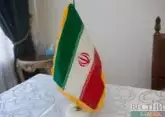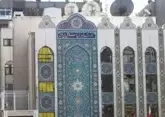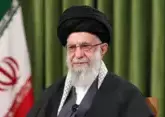The Syrian government is ready to provide the necessary infrastructure to establish a base for the permanent deployment of the Iranian armed forces. Such a conclusion can be drawn from a recent statement made by the Syrian President Bashar Assad in interview with Iranian channel al-Alam News. Assad reaffirmed the desire of the republic's leadership to support the strategic partnership between Damascus and Tehran, saying that it is not going to break ties with Iran in the future, despite the possible problems associated with the presence of Iranian armed forces in Syria.
Iran makes no secret of the presence in Syria of both volunteers and special forces specializing in conducting operations abroad, including the well-known Quds Force unit. The picture of Tehran's participation in the support of Bashar al-Assad becomes even more ambitious considering the fact that the members of the Supreme Command of the Islamic Revolutionary Guard Corps (IRGC), brigadiers Hossein Hamedani and Hamid Mokhtarband, as well as Major General Farshad Hasanzadeh, died during the years of civil confrontation in Syria.
Tehran's interest in maintaining the current regime in Syria is due to several reasons. First, Tehran has welcomed the Syrian position on regional issues over the past 40 years, stressing that the Islamic Republic and Syria have a special view of "Middle Eastern affairs", opposing the efforts of the United States and Israel in the Middle East, primarily in Palestine. Second, both countries regularly held bilateral meetings at a high diplomatic level, discussing the Kurdish problem. Syria is the only republic with which Tehran is ready to consult on the Kurdish issue, urgent for it as well. Finally, the preservation of unified Syria is a matter of Iran's security, because the war and the subsequent "reconstruction" of Iraq forced Iran to make enormous efforts to ensure its own security on the Iran-Iraq border. The war on the near line of defence (that is how Iraq was traditionally perceived by the Iranians) defined Syria as a link between Iran and friendly to it Lebanon. Against this background, the destruction of unified Syria would mean a final weakening of Tehran's positions in the entire Middle East.
But why is Iran in no hurry to establish its own military base in the territory of the Syrian Arab Republic, especially since Damascus is ready provide active assistance? The current format of Iran's presence in Syria allows Tehran to resolve strategic issues, avoiding political responsibility. It is obvious that "young officers", including volunteers,get the hands-on experience in Syria in battlefield situations. The war showed the Syrian army's fighting capacity, its reliability, and Tehran expects to achieve such results, not fighting on its territory. The special operations in the south of Syria allow Iran to "test" the defenses of its enemy Israel, thereby obtaining the necessary intelligence.
The words that the Iranians are ready to fight for Syria to the end are not unreasonable. Their involvement in the conflict has been gradual and started long before Russia's full-scale intervention. It was advisors and veterans of the 1980-1988 Iran-Iraq war that helped Damascus to transfer the country's economy to military rails, as the republic was cut off from the oil fields captured by terrorists - one of the primary sources of Syria's income. By the way, the sale of cheap oil produced by terrorists inflicted a significant blow not only on the income of Syria, but also Iran, also an oil and gas exporter. By establishing control over the fields, Iran simultaneously restores the balance of sales and extraction of resources, simultaneously providing material and technical (including fuel) support to the Syrian leadership, thereby denying responsibility for its financing.
As for the Iran-Israel confrontation, the issue of establishing a military base is not very popular in geopolitical terms. Tehran does not hide its desire to destroy the Jewish state. The relations between Syria and Israel are also far from ideal, however Damascus does not seek a feud with Tel Aviv. Nevertheless, the creation of an Iranian military base in Syria can dramatically complicate relations between neighboring republics, thus the West will receive a basis for accusing Damascus and Tehran of preparing a possible war with Israel, thereby providing Tel Aviv carte blanche to continue anti-Iran rhetoric with all its consequences. This concerns, among other things, Israel's nuclear program, as well as special operations against Islamic organizations, friendly to Iran and Syria, including Lebanese Hezbollah.
Finally, the Iranian military base in Syria under current conditions would be a convenient target for Israel's military aircraft, which violates Syrian airspace from time to time, launching missile and bomb strikes, without bearing any responsibility. Given such circumstances, Iran will not risk by investing in it, because in the case of an air raid it may lose an impressive continent of its own troops, since only modern air defense systems can protect such a base, which Iran does not have, and those available (Russia's S-300) are guarding Iranian nuclear facilities. Therefore, most likely, Tehran will limit itself to the current "semi-legal" presence in Syria.










